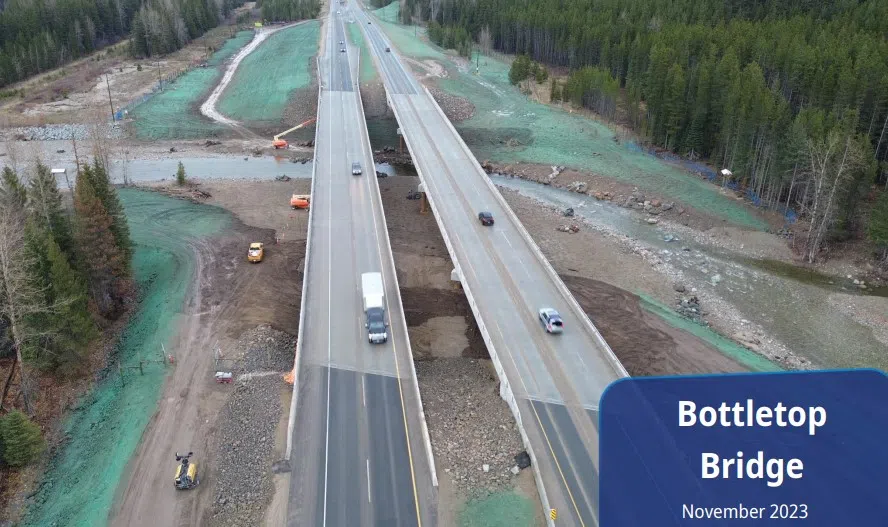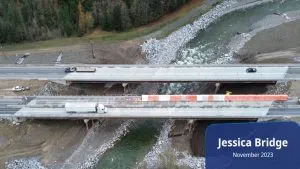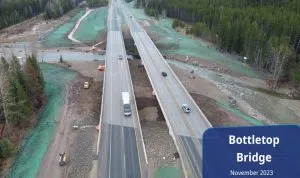
Repairs to the Bottletop Bridge along the Coquihalla Highway in Nov. 2023. (Photo via Ministry of Transportation and Infrastructure)
B.C.’s Transportation Minister says permanent repairs to fix the Coquihalla Highway between Hope and Merritt have been completed.
Rob Fleming’s announcement comes just past the two year anniversary of the devastating floods and mudslides that damaged nearly two dozen sections of the Coquihalla.
He says the repairs included six new climate-resilient bridges built in place of the ones that were destroyed in November of 2021.
“The companies and workers that pulled off this amazing accomplishment, who built a bridge every two and a half months during construction have our every lasting gratitude as a province,” Fleming said.
“They worked non-stop for two years and now one of our most important trade corridors is better than ever, and able to withstand future climate events.”
Jennifer Fraser, executive project director for the highway reinstatement program, says the six bridges on the Coquihalla were replaced over 17 months. Some bridges were made longer to allow more water to pass underneath with Fraser noting crews strategically placed rocks and vegetation to help fight erosion.
Fraser said the bridges are also on stronger supports, with the longest pile being driven 65 metres into the ground – or approximately 15 stories – into the ground.
“So these bridges are made to accept a lot more water, and a lot more force of water than the bridges that were there previously,” Fraser said. “In order to get six bridges done in 17 months, obviously it takes a huge team, all laser focused on our goals, and all working very much together to get this work done.”
Fleming says more than 300 workers were involved in the repairs on the major B.C. highway, which was opened to four-lane traffic last December.
He says they used 200 pieces of equipment and moved more than 400,000 cubic metres of gravel, rock, and other material to repair and reopen the highway to commercial traffic in December 2021 and to all traffic a month later, in January 2022.
“So those corridors are understood (as to) where those vulnerabilities are,” Fleming said.
“More work will be done, but the qualified engineers that we have in our ministry and the contractors we use, constantly evaluate where those vulnerabilities may be and prescribe what kinds of fixes and upgrades to that infrastructure might look like.”
A series of atmospheric rivers in November 2021 triggered mudslides and washed out highways and bridges that blocked almost every route between the Lower Mainland and the Interior.
“Our infrastructure has to be able to withstand extreme weather conditions. This is the new normal,” Fleming said. “The sheer number of people involved in the work to reconnect British Columbians after the storm is nothing short of extraordinary but it also shows how much damage was done by one large extreme climate weather event.”
“We hope that we don’t have to talk about broken infrastructure in the future but the effort that was put in to meet the test when it did occur was extraordinary.”
Fleming says the repairs to the Coquihalla, Highway 1 in the Fraser Canyon, and Highway 8 between Merritt and Spences Bridge is expected to cost between $1-billion and $1.5 billion.
He notes the Federal Government’s disaster relief program is expected to cover between 70 and 90 per cent of those costs.
- Repairs to the Jessica Bridge along the Coquihalla Highway in Nov. 2023. (Photo via Ministry of Transportation and Infrastructure)
- Repairs to the Bottletop Bridge along the Coquihalla Highway in Nov. 2023. (Photo via Ministry of Transportation and Infrastructure)
– With files from The Canadian Press

















